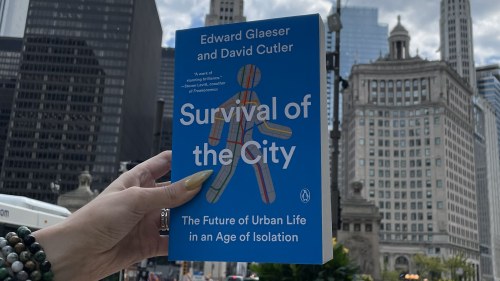Survival of the City: Ed Glaeser on the Future of Post-Pandemic Urban Life

Pattis Family Foundation Global Cities Book Award nominee Edward Glaeser examines the gaps in health care, education, and governance laid bare by the pandemic.
In August 2023, the Council announced the six-title shortlist for the inaugural 2023 Pattis Family Foundation Global Cities Book Award, which celebrates books that deepen our understanding of the role cities play in addressing critical global challenges. Over the coming weeks, we’ll be sharing interviews with the shortlisted authors discussing their books and the pressing issues facing cities today.
In Survival of the City: The Future of Urban Life in an Age of Isolation, Edward Glaeser and David Cutler argue that to preserve city life as we know it, especially after the disruptions of the COVID-19 pandemic, massive gaps in health care, education, and governance must be filled.
Glaeser is the Fred and Eleanor Glimp Professor of Economics at Harvard University. Cutler is a research associate at the National Bureau of Economic Research and served on the Council of Economic Advisers and the National Economic Council during the Clinton Administration. Glaeser recently joined us for a conversation on the influences of their book. The author’s responses have been lightly edited.
Q: Cities are not just places but are becoming actors in shaping local and international policy. What lessons do you hope other cities take away from your book?
A: The past 15 years have exposed the painful urban inequities that exist alongside urban success. Big city schools too often fail poorer children. Too many young men spend years in prison. Housing is far too expensive. There is an understandable urge to fix these problems by taxing businesses and the rich, but those groups are more mobile than ever. The work from home revolution means that it has never been easier for skilled workers and their employers to leave a high-tax environment that fails to keep its streets safe.
The lesson is that we must focus on making our city governments better, not just more expensive. We must have a police department that both treats all citizens with respect and that delivers public safety. We need to make it easier to build housing for ordinary people and easy to start ordinary businesses. Ultimately, this moment calls for better urban management, and a rethink of the regulations that too often limit urban aspirations.
Q: What is the greatest challenge facing cities today and how do cities move forward?
A: The greatest challenge facing American cities is to provide pathways from poverty to prosperity. Cities have always been unequal. Plato wrote in the Republic that “any city, however small, is in fact divided into two, one the city of the poor, the other of the rich.” Cities are pleasant places to be rich, and slightly less difficult places to be poor. Yet urban inequality only becomes tolerable when cities turn poor children into rich adults, and American cities are failing in that crucial task.
How can we make progress towards expanding opportunity? We must start by recognizing that we don’t have a magic bullet, and that we must have the humility to learn. In our book, we advocate experimenting with vocational training that wraps around [and complements] conventional school curriculum, providing programming or plumbing skills after-school, on weekends, and during the summer. Since vocational skills are much easier to measure than traditional knowledge, these programs can be provided by a wide range of entities, and they can be pay-for-performance.
The greatest challenge facing the cities of the global south is likely to come from climate change. The combination of heat and flooding could kill thousands unless they become stronger and more resilient. As with upward mobility in the United States, we have to start by accepting the limitations of our knowledge and embracing a learning agenda.
Q: Which book(s) influenced you the most in crafting yours?
A: The urban books that have shaped my writing as a whole most include Jane Jacobs’ The Death and Life of Great American Cities and The Economy of Cities, Robert Caro’s Power Broker, and William Cronon’s Nature’s Metropolis. Charles Rosenberg’s The Cholera Years influenced this particular book, as did many other books on the history of public health in the city.
Q: What area of study did you intend your book to contribute to, and why did you choose that topic to write on?
A: I wrote about cities surviving the onslaught of COVID-19 and the work-from-home revolution because I was working from home during the pandemic. I am an economist, but I was hoping that the book would contribute to the larger public dialogue about making our cities more functional. Within economics, the book spans the fields of urban and health economics.
Q: What are you trying to achieve with your book?
A: My meta-goal is always trying to get young people excited about cities. The future of the world is urban, and I can think of no higher vocation than making the world’s most vulnerable cities into places that are safer, more humane, more dynamic, and more inclusive. Cities look more troubled now than they did 10 years ago, but that is all the more reason to redouble our efforts to make them stronger. I have spent my life studying cities and trying to improve urban governance, and it has been a very joyful existence, partially because urban interactions have so much upside.
We also had three more limited objectives with this book. We wanted to highlight the need to create institutions that might protect us against the next pandemic. We wanted to make the case for improving urban services by focusing on the details of good management. And we wanted to stay connected and active despite being exiled from our campus by a pandemic.



